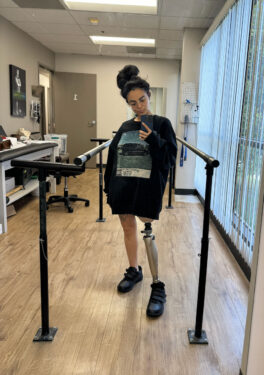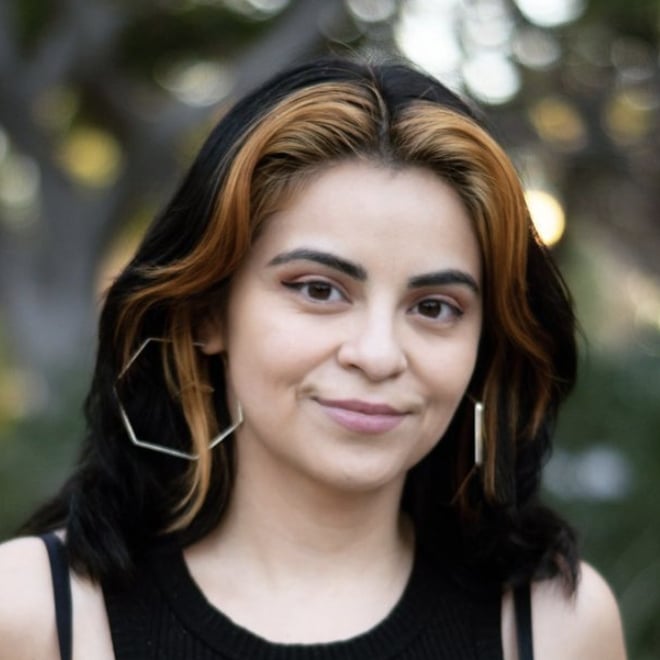Fact checked by Jim Lacy
I’ve spent most of my life trying not to inconvenience people. After I lost my leg at age 9 due to complications from bone cancer, I began a lifelong mission to “pass.”
“Passing” is the act of a minority blending into the majority, either intentionally or not. This could look like a person of color passing as white, a queer person passing as straight, or, in my circumstance, a disabled person passing as able-bodied. If there were an obstacle in my way — a long set of stairs, for example — I would hobble up rather than ask my friends to take the elevator with me. There have been countless times when my prosthetic leg has run out of battery and I made up an excuse to leave, rather than slow anyone else down.
Silent endurance is the key to passing in an ableist world.
For those less familiar, ableism refers to a set of attitudes, behaviors, and systems that devalue or discriminate against people with physical, intellectual, or psychiatric disabilities. It often stems from the belief that disabled individuals need to be fixed or cured. In my case, ableism manifested as erasure. I felt pressure to blend in so that I would not experience being left out.

Chicago made blending in more possible. On the whole, the city is surprisingly accessible for a large urban area. We have reliable public transportation, flat sidewalks, and the downtown is one of the cleanest city centers I’ve seen.
But that doesn’t mean it’s perfect. Chicago Transit Authority (CTA) stations are frequently plagued by broken elevators and non-functional escalators. In the winter, Chicago becomes a minefield of black ice. People abandon Divvy bikes and scooters wherever they please, and potholes and cracks in the sidewalk often feel like chasms. Yet, after traveling to many other cities worldwide, I’ve never taken Chicago’s accessible moments for granted.
But then, at 35, everything changed for me. I was diagnosed with cancer again. Over the course of the nine preceding months, my body started signaling in ways I could no longer ignore. Digestive issues, waves of extreme fatigue — each day became a struggle. But as difficult as it was, I also learned something profound about myself: I no longer had any interest in trying to conform to society’s expectations of a normal, able-bodied person.
Colorectal cancer, if nothing else, has encouraged me to enforce the boundaries my body was making on my behalf. There were so many times my friends wanted me to drink, or my partner wanted to go out. For the first time in my life, I had to prioritize my body’s needs.
The disability community widely recognizes that almost everyone will experience a disability at some point in their lives. According to the Centers for Disease Control and Prevention, more than 70 million U.S. adults report living with a disability, with millions more affected by undiagnosed invisible disabilities that shape their daily experiences. Whether due to a temporary physical injury, long-term health condition, or acquired chronic illness, most people have encountered some form of ableism in their lives.
We’re up against a society that demands productivity at all costs, values hustle over health, and often makes it difficult for those with physical disabilities and chronic illnesses to feel seen or supported.
This generation, in particular, is poised to face unprecedented long-term health challenges. Young people today are being diagnosed with cancers once considered conditions of the elderly (see “Cancer’s Younger Scope” for a story on this topic). According to a study published in BMJ Oncology, between 1990 and 2019 cancer cases among younger adults increased by nearly 79% worldwide.
Similarly, chronic illnesses are on the rise due to long-term effects of Covid-19. Research now links more than 200 symptoms to long Covid, including fatigue, memory and cognitive issues, and lasting sensory changes, among others. It’s becoming clear that even young people are not immune to the impacts of the virus.
This shift in our understanding of health has prompted me to reevaluate how I approach my own disability. I’m not going to constantly push myself to do or be more. Instead, I’m advocating for myself and others who are navigating disability and chronic illness, demanding the accommodations we need in a world that isn’t built for us. I’m embracing self-advocacy, pushing back against ableist structures, and carving out space for people like me to thrive.
Disabled people are not an afterthought but a fundamental part of an equitable society.
We’re up against a society that demands productivity at all costs, values hustle over health, and often makes it difficult for those with physical disabilities and chronic illnesses to feel seen or supported. We need to build a world where cities invest in the resources needed to support disabled and chronically ill people — through research and practical infrastructure. We are worthy of the world we need. Let’s build it.
Photo at top: Michelle Zacarias. Photo by Miguel Moya
Originally published in the Spring/Summer 2025 print issue.

Michelle Zacarias (she/her) is an award-winning journalist and queer Latina storyteller from Chicago. For over a decade, she has reported on issues related to politics, civic engagement, LGBTQIA+ issues, access justice, and state-sanctioned violence. Michelle currently resides in Southern California, where she works as a reporter for CALÓ News and serves as a UC Berkeley Local News Fellow.











